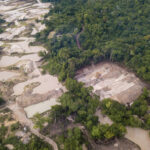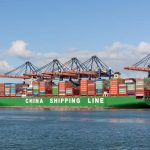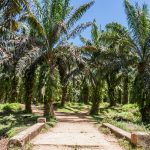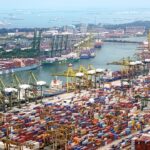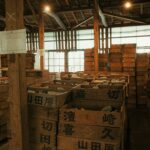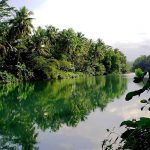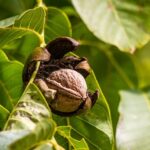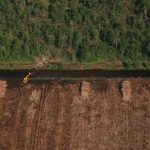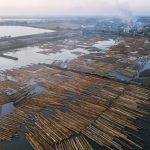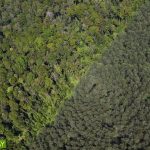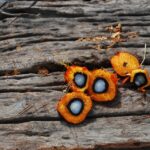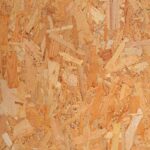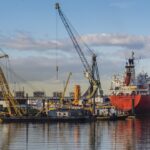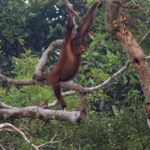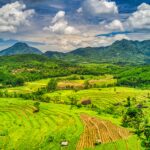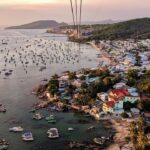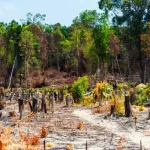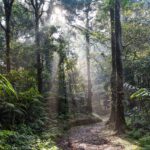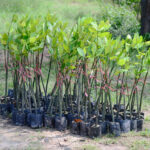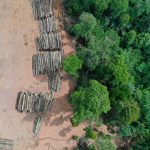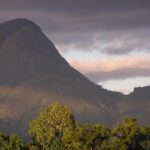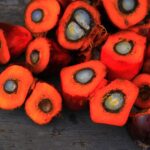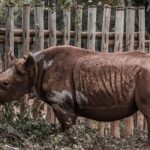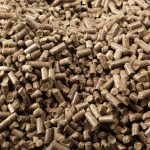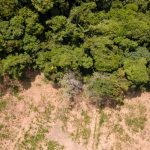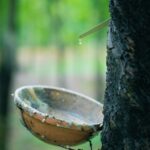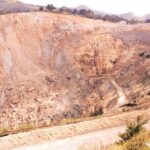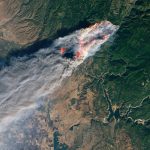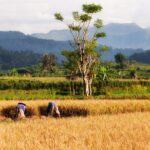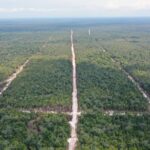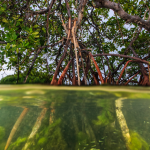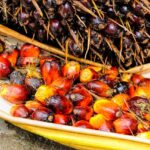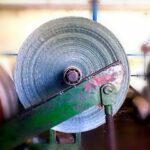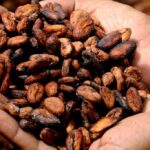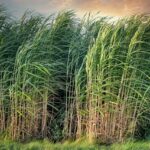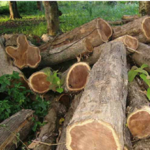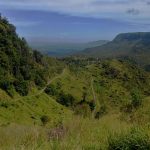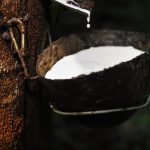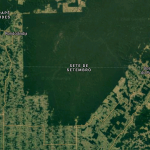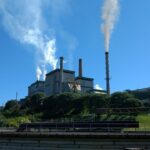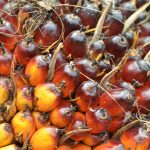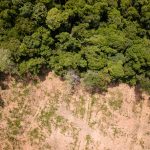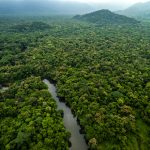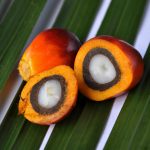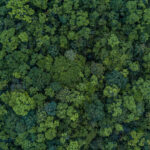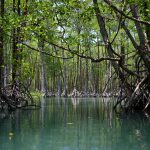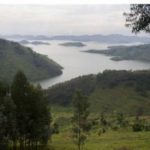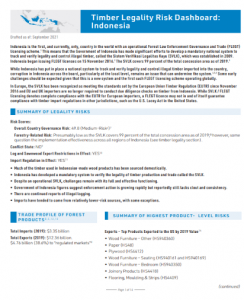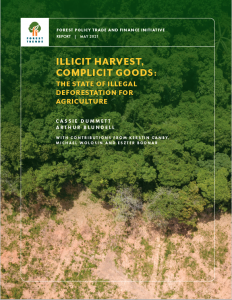
Indonesia is the first, and currently, only, country in the world with an operational Forest Law Enforcement Governance and Trade (FLEGT) licensing scheme. This means that the Government of Indonesia has made significant efforts to develop a mandatory national system to track and verify legality and control illegal timber, called the Sistem Verifikasi Legalitas Kayu (SVLK), which was established in 2009. Indonesia began issuing FLEGT licenses on 15 November 2016. The SVLK covers 99 percent of the total concession area as of 2019. While Indonesia has put in place a national system to track and verify legality and control illegal timber imported into the country, corruption in Indonesia across the board, particularly at the local level, remains an issue that can undermine the system. Some early challenges should be expected given that this is a new system and the first such FLEGT licensing scheme operating globally.
In Europe, the SVLK has been recognized as meeting the standards set by the European Union Timber Regulation (EUTR) since November 2016 and EU and UK importers are no longer required to conduct due diligence checks on timber from Indonesia. While SVLK / FLEGT licensing denotes complete compliance with the EUTR for European importers, a FLEGT licence may not in and of itself guarantee compliance with timber import regulations in other jurisdictions, such as the U.S. Lacey Act in the United States.
- Much of the timber used in Indonesian-made wood products has been sourced domestically.
- Indonesia has developed a mandatory system to verify the legality of timber production and trade called the SVLK.
- Despite an operational SVLK, challenges remain with its full and effective functioning.
- Government of Indonesia figures suggest enforcement action is growing rapidly but reportedly still lacks clout and consistency.
- There are continued reports of illegal logging.
- Imports have tended to come from relatively lower-risk sources, with some exceptions.
Read more by downloading the Indonesia Timber Legality Risk Dashboard here.
Department of Commerce sides with local plywood producers and will apply retrospective duties on Chinese shipments entering up to 90 days before January 16, 2026.
The preliminary findings were released late last week, confirming that producers in China, Vietnam and Indonesia – which supply the vast majority of decorative plywood entering the U.S. market – received highly favourable government subsidies that gave them an unfair advantage over domestic manufacturers. U.S. Customs and Border Protection is expected to begin collecting duties in the coming weeks once the determination is formally published in the Federal Register.
Indonesia’s Ministry of Forestry plans to recruit an additional 21,000 forest police officers to strengthen monitoring and law enforcement in forest areas, amid the continued spread of illegal mining across the country.
Deputy Minister of Forestry Rohmat Marzuki said mining activities within forest zones currently cover 296,807 hectares nationwide. Of that total, only 105,017 hectares hold Forest Area Utilization Permits.
On January 16, the U.S. Department of Commerce released its preliminary affirmative countervailing duty findings on hardwood and decorative plywood after identifying significant subsidies provided by the governments of China, Indonesia, and Vietnam. Commerce calculated preliminary countervailing duties of 81.34% on imports from China, 2.40% to 128.66% on imports from Indonesia, and 4.37% to 26.75% on imports from Vietnam. These rates will be added to existing tariffs on products from these countries and will be charged as soon as the decision is published in the Federal Register.
In addition, preliminary antidumping rates are scheduled to be announced in late February 2026. Final rulings are expected in early May.
Indonesia’s military-backed forestry task force, created under President Prabowo Subianto, has stepped up enforcement against plantation and mining companies operating in forest areas without permits, warning that firms refusing to pay fines may now face criminal charges. Government spokesperson Barita Simanjuntak said authorities will escalate action against companies that ignore summonses, formally object to penalties, or continue unauthorized activities. The campaign, described as unprecedented in scale, has created uncertainty in the palm oil and mining sectors and coincided with higher global palm oil prices and rallies in metals such as tin. Authorities have seized more than 8,800 hectares of mining concessions producing nickel, coal, quartz sand, and limestone, and moved against oil palm operations covering 4.1 million hectares. Of the firms summoned, many have resisted, but seven mining companies and 54 palm oil companies have paid or agreed to pay a combined 9.3 trillion rupiah (US$552 million), including subsidiaries of Salim Group, Best Agro Group, Sampoerna Agro, and Astra Agro Lestari. Other firms, including Goodhope Group and Musim Mas Group, have not attended summonses, while Attorney General Sanitiar Burhanuddin has said potential fines could total more than 140 trillion rupiah across the palm oil and mining sectors.
The Indonesian government says it has reclaimed more than 4 million hectares of land used for plantations, mining and other activities inside officially designated forest areas.
This is part of a crackdown on illegal activities in forest areas, carried out by a year-old task force formed by President Prabowo Subianto. Land seizures have exceeded the initial target by 400%, officials say, and the scale of the enforcement raises questions about how many oil palm plantations in the country are actually illegal.
The task force has recovered about US$136 million in administrative fines, collected from 20 oil palm companies and one nickel mining company; it remains unclear what the money will be used for — and what will happen to the seized plantations and mines.
Malaysia has emerged as China’s fastest‑growing supplier of fibreboard, recording a remarkable 683% surge in shipments to 1,400 tonnes in the first nine months of 2025, according to new data from China Customs. The jump — the largest of any supplying country — comes as China’s total fibreboard imports rose 16% year‑on‑year to 45,000 tonnes – up to 50% of the world’s supply, signalling renewed demand from downstream manufacturers. New Zealand, Thailand, Germany, and Spain followed.
Vietnam remained China’s largest overseas market, with imports soaring 126% to 501,000 tonnes. Strong growth was also recorded in Saudi Arabia, Mexico, the United Arab Emirates, and Canada, each posting double‑digit increases. Exports to the United States and Nigeria softened, falling 9% and 1% respectively.
China’s wooden furniture sector, however, continues to face headwinds.
Export receipts fell 7% to US$16.69 billion in the first nine months of 2025, with shipments to the United States — China’s largest market — plunging 18% to US$4.24 billion. Despite the downturn, China maintained strong sales to other major destinations, exporting US$1.2 billion worth of wooden furniture to the United Kingdom and US$1.1 billion to Australia. Malaysia also remained a significant buyer, importing US$445 million worth of China‑made wooden furniture — an 18% increase year‑on‑year.
China’s wooden furniture imports also declined, falling 6% to US$461 million over the same period. Italy remained the largest supplier, accounting for 46% of China’s total imports, though shipments fell 9% to US$214 million. Declines were also recorded from Germany, Vietnam, and France. Whilst several smaller suppliers bucked the trend, with imports rising from Thailand, Slovakia, and Indonesia.
China’s grip on timber supply chains only strengthened after securing more than US $2.7 billion (19.4 billion yuan) in forest contracts during the World Forestry Industry Conference in Nanning, Guangxi Zhuang.
Often described as “the World’s Factory,” China is connected to more than 30% of the total global trade in forest products, including more than 70% of the world’s plywood on the mainland or via Chinese-owned interests in Malaysia and Indonesia. As the world’s largest consumption market, it swallowed 18% of global demand and 71% of Asian demand for forest products. It has the highest reliance on imports – with the share of imported wood at 55%, including sawn timber, logs, pulp and paper.
The Indonesian National Police (INP)’s Criminal Investigation Agency has named suspects in an illegal logging case linked to flooding in North Sumatra, marking a major step in the ongoing investigation.
“We have formally named suspects, both a corporation and an individual,” said Brigadier General. Moh. Irhamni, the Director of Certain Crimes at the Agency.
The decision followed a joint case review with the Attorney General’s Office last week. Investigators found that logs at the crime scene were traced to PT TBS, with at least 16 company witnesses questioned so far. Authorities believe the illegal logging contributed to severe environmental damage and flooding. Chief Irhamni said that the suspects will face charges under environmental crime laws and money laundering statutes.
A nearly 70% rise in global gold prices has accelerated illegal gold mining across Indonesia, including in Bukit Gajah Berani, a forest buffer next to Kerinci Seblat National Park, threatening critical tiger habitat and protected forests nationwide.
Despite decades of evidence and Indonesia’s commitments under the Minamata Convention, illegal gold mining remains the country’s largest source of mercury emissions, contaminating rivers, fish, crops and communities, with documented health impacts ranging from toxic exposure to malaria spikes.
While Indonesia has strong regulations on paper, including a pledge to eliminate mercury use in illegal mining by 2025, enforcement is weak, agencies operate in silos, illegal cinnabar mining continues, and attempts to formalize “community mining” have largely failed in practice.
The Criminal Investigation Agency of the Indonesian National Police (Bareskrim) is investigating illegal logging in Aceh Tamiang. Brigadier General Mohammad Irhamni, Director of Specific Criminal Acts at Bareskrim, suspects that logging in protected forests has occurred for over 20 years. Irhamni noted that the logging likely happened in two protected areas. These sites are the Serbajadi and Simpang Jernih protected forests in East Aceh. Bareskrim is currently searching for the main actors behind these operations.
Earthsight and local partners found large tracts of virgin forest and orangutan habitat have been cleared illegally within the concession of timber plantation and pulp company PT Toba Pulp Lestari (PT TPL).
The researchers traced the wood pulp the company produces to a major manufacturer and exporter of ‘rayon’ from wood fibres, used in the manufacture of clothing and other products sold across the globe.
PT TPL asserted that all its operations are legal; that it does not cut any natural forests; and that there is no connection between the company’s activities and the floods and landslides
Accelerating deforestation in Borneo, driven largely by logging, plantation expansion, and land conversion, is directly threatening nut-producing tree species and reducing the areas where they can grow. Forest clearance is fragmenting remaining tree stands and disrupting harvest cycles, leading to declining yields and making nut collection increasingly difficult and unreliable. As deforestation continues, the article notes that both commercial supply chains and local producers face growing losses tied to the shrinking forest base.
In January 2026, a Mexican biologist was reported kidnapped in Veracruz, with local sources confirming he disappeared after responding to a request for a meeting and has not since been located. Mongabay News The Mongabay team noted this incident alongside broader patterns of violence affecting scientists and environmental defenders in the region. Mongabay News In related Mongabay coverage from 2025, at least 146 environmental defenders were killed or disappeared worldwide, with Mexico recording at least 18 such cases, underscoring ongoing security risks for people in these fields.
An NTU study led by Dr Lubis (PLOS One) found flood-prone Aceh areas had fewer trees, more palm oil, and higher poverty, with over 2,000 floods between 2011-2018. Dr Lubis suggests conditional cash transfers linked to forest restoration can aid recovery and reduce future flood risk
Increase in enforcement did not mean that forest and land fires were getting out of hand but showed the seriousness of law enforcement in against land and forest fire perpetrators, Riau Police chief Insp. Gen. Herry Heryawan said.
More than 1.5 million hectares of forestry permits and concessions have been cancelled as Indonesia launches a criminal probe into the destruction fuelled by timber swept through floodwaters during Cyclone Senyar.
Indonesia’s Ministry of Forestry has uncovered a massive timber‑laundering network in North Sumatra, widening an ongoing investigation into land‑rights holders suspected of contributing to destruction linked to Cyclone Senyar. It follows the Indonesian Directorate General of Forestry Law Enforcement, confirming that initial inquiries focused on a land‑rights holder identified as JAM, suspected of harvesting forest products without the required permits.
The investigation has since expanded to two additional PHAT (land‑rights) holders, identified as M and AR. M is believed to have received illegally sourced logs, while AR is accused of logging outside its concession boundaries.
Officials allege that AR mixed timber harvested illegally from outside the concession with legally sourced wood, enabling it to enter the formal supply chain — a classic timber‑laundering technique.
Yazid Nurhuda, Director of Forestry Prevention and Complaint Management, said the findings point to organised activity rather than isolated violations.
Indonesia will revoke 22 permits covering 1 million hectares due to concerns over deforestation, illegal logging and flooding.
Sustainable forestry certifier PEFC is under fire for its endorsement of Indonesian plantation firm IFP despite it being a major recent deforester, with tens of thousands of hectares cleared in orangutan habitat and ongoing forest loss documented into 2024. Earthsight and other NGOs say the certification exploits loopholes, including PEFC’s “partial certification” model that lets companies exclude recently cleared areas while still selling certified timber.
Deforestation-linked timber may have entered global supply chains, with mills processing IFP-linked wood exporting large volumes to the EU. Critics say PEFC’s weak safeguards and Indonesia’s IFCC certification system enable greenwashing, and call for IFP’s certification to be revoked and rules tightened to bar any company or corporate group involved in post-2010 forest clearing.
President Prabowo Subianto ordered the addition of forest rangers (Polhut) to strengthen supervision and prevent encroachment and illegal logging, as informed by Forestry Minister Raja Juli Antoni. Antoni cited the example of Aceh, which is only manned by 30–32 forest rangers on duty for a forest area of 3.5 million hectares.
The ministry would also conduct a complete audit and evaluation of the operating permits of Toba Pulp Lestari, which operates in forest product processing, particularly pulp and its derivatives. In a Plenary Cabinet Meeting on Monday, President Prabowo also announced the plan to review all land use permits, such as forest concession rights (HPH) and mining business permits (IUP), with no new permits or extensions to be issued in 2025.
Interpol announced that from 15 September – 15 October, law enforcement agencies comprising police, customs, border security and forestry and wildlife authorities from 134 countries made a total of 4,640 seizures during Operation Thunder 2025.
Interpol announced that from 15 September – 15 October, law enforcement agencies comprising police, customs, border security and forestry and wildlife authorities from 134 countries made a total of 4,640 seizures during Operation Thunder 2025.
The Forestry Ministry (Kemenhut) is investigating 11 business entities in Tapanuli Selatan District, North Sumatra, suspected of being involved in the floods and landslides that struck the region. The four companies are PT TPL, PT AR, PT TBS/PT SN, and PLTA BT/PT NSHE, as well as the seven PHATs: JAM, AR, RHS, AR, JAS, DHP, and M.
Meanwhile, the Directorate General of Law Enforcement (Gakkum) of the Forestry Ministry also conducted field verification and crime scene investigations at the locations of the PT TBS/PT SN and PLTA BT/PT NSHE corporations and discovered warning signs from the Forest Area Enforcement Task Force (PKH) at the locations. Based on the investigation, it is suspected that a criminal act of harvesting or collecting forest products within the forest has occurred without the necessary rights or approval from authorized officials.
PT Industrial Forest Plantation (PT IFP), has been certified as ‘sustainable’ under the Programme for the Endorsement of Forest Certification (PEFC). Between 2016 and 2022, the company cleared nearly 22,000 hectares of natural forest within a key orangutan stronghold in central Borneo . Despite a public pledge to end deforestation in August 2023, PT IFP continued to clear natural forest for at least 10 months after this date. Auditors were aware of this, yet still approved certification in November 2024
Earthsight argues that PEFC standards allow companies to greenwash their image by certifying only selected areas that meet sustainability criteria – even if other parts of the of the same concession have been recently deforested
Indonesia has suspended all timber harvesting and transportation in Aceh, North Sumatra, and West Sumatra after flash floods and landslides killed nearly 1,000 people and caused widespread destruction to public infrastructure. Announced yesterday, the Indonesian Forestry Ministry said large amounts of timber debris prompted the emergency policy, which was swept downstream during the floods.
Under the moratorium, all forestry businesses must revise their annual work plans with an emphasis on protecting ecosystems, with companies ensuring that flood‑control infrastructure is functioning, that waterways remain clear of log debris, and that stockpiled timber is safely secured.
Indonesia’s Environment Ministry said it would summon eight firms suspected of contributing to the floods, demanding they explain the presence of timber swept downstream. The ministry is also investigating permits in Batang Toru, where deforestation has undermined natural flood defences.
Indonesia’s Ministry of Forestry has authorized the use of timber washed away during natural disasters for emergency response and post-disaster reconstruction, but only under strict legal controls. The ministry classified this material as “found timber” subject to Law No. 18/2013 on the Prevention and Eradication of Forest Destruction, which governs traceability and accountability. Authorities emphasized that all collection, transport, and use must be reported and recorded to prevent illegal logs from being laundered through disaster response efforts. Distribution must be coordinated across national, provincial, and local agencies, along with law enforcement, rather than handled unilaterally. To further reduce the risk of abuse, the government temporarily suspended timber harvesting and transport in affected provinces to prevent illegal logging being disguised as flood-recovered wood.
The Directorate General of Law Enforcement under Indonesia’s Ministry of Environment and Forestry is investigating 12 legal entities suspected of damaging forests in the upstream areas of Tapanuli Utara, Tapanuli Tengah, and Tapanuli Selatan, NNorth Sumatra. The Ministry is also investigating potential misuse of legal land rights (PHAT) as a cover for illegal logging on state forest lands.
A joint investigation team has been formed to collect evidence on the suspected activities. The 12 suspects include both corporations and individuals. Since December 4, 2025, investigators have installed prohibition signs at five key locations: two in PT TPL’s concession area and three on lands held by individuals identified as JAM, AR, and DP. The legal framework under investigation includes Article 83 paragraph (1) letter b in conjunction with Article 12 letter e of Law No. 18 of 2013 on the Prevention and Eradication of Forest Destruction. Convictions carry up to five years in prison and fines of up to IDR 2.5 billion.
Beyond criminal investigations, authorities are considering applying the Anti-Money Laundering Law to trace and seize assets derived from forestry crimes. Civil lawsuits may also be filed under Articles 72 and 76 of the Forestry Law to restore ecological functions in affected areas.
The Attorney General’s Office (AGO) has opened the door to investigating whether extensive illegal logging contributed to the deadly floods and landslides that have devastated parts of Sumatra over the past week, as the death toll surged to 442.
The Forest Area Enforcement Task Force (Satgas PKH)—which includes the Attorney General’s Office, the National Police, the military, and the Forestry Ministry—is examining whether the disaster, which struck North Sumatra, West Sumatra, and Aceh amid cyclone-driven torrential rain, was entirely natural or intensified by human activity, particularly large-scale deforestation.
The renewed scrutiny comes as the task force recently exposed what officials describe as a major illegal logging operation in West Sumatra. According to the task force, the scheme involved an organized system to “launder” illegal timber by falsifying documents to make the wood appear legally sourced. One of the cases involves timber company Berkah Rimba Nusantara (BRN), operating in the Mentawai Islands. The investigation, which began in October, has named the company’s 29-year-old president director — identified by the initials IM — as a suspect.
A 20-person joint team dismantled 18.5 hectares of oil palm plantations discovered between km 18 and km 25 of the Southwest Aceh–Gayo Lues road. The operation followed complaints from three forest farmer groups—KTH Sejahtera Bersama, KTH Tuah Nanggroe, and KTH Tuah Seudong Rimba—whose social forestry permit applications were jeopardized by the presence of the plantations. The groups had already undergone technical verification by BPS, BPKH, and the Aceh Forestry Environment Service in August 2025. Officials underscored that Ministerial Regulation No. 9/2021 explicitly bans oil palm cultivation within social forestry areas. Before enforcement began, authorities had issued warnings and urged communities to remove the plantings voluntarily.
Tiong was the executive chairman of Rimbunan Hijau and the honorary chairman of Sin Chew Daily. Tiong and his family were on the Forbes list of Malaysia’s 50 Richest in April this year, placing 25th with an estimated net worth of US$820mil (RM3.4bil).
Other than timber exports and timber processing, his business expanded to media and publishing, agriculture (oil palm plantations and mills), oil and gas, mining, aquaculture, reforestation, finance, information technology, trading and property development. Today, the group is a diversified multinational with operations in Malaysia and across numerous countries, including Singapore, Indonesia, Cambodia, Hong Kong, Japan, South Korea, Papua New Guinea, Australia, Russia, the Congo, Equatorial Guinea, Gabon, Guyana, Canada, and the United States.
Interpol and partners launched a global law enforcement effort Wednesday aimed at dismantling criminal networks behind illegal logging, timber trafficking and gold mining, which drive large-scale deforestation and generate billions in illicit profits each year.
The effort announced ahead of the U.N. COP30 climate summit in Brazil will focus mainly on tropical forests in Brazil, Ecuador, Indonesia, Papua New Guinea and Peru.
On October 31, DHA provided official comments and analysis to the Office of the U.S. Trade Representative for use in the USTR’s 2026 National Trade Estimate Report on Foreign Trade Barriers. DHA highlighted how the flood of illegally dumped and subsidized imports from Asia now dominates 80% of the U.S. hardwood plywood market and how this has decimated U.S. manufacturers and workers.
The Indonesian authorities have uncovered illegal logging operations in the Mentawai Islands, confiscating 4,610.16 cubic meters of timber from the Sipora Forest, estimated to cause state losses of up to Rp240 billion (US$14 million).
PT BRN is suspected of conducting organized illegal logging from 2022 to 2025 in Tuapejat and Betumonga Villages, involving cutting timber outside the permitted area, encroaching into forest zones, and falsifying Forest Product Legality Certificates (SKSHH) to legitimize the timber.
A joint operation between Indonesia’s Maritime Security Agency and the Ministry of Forestry thwarted an attempt to smuggle hundreds of undocumented logs at a port in the city of Batam, according to Batam News Asia.
The operation swung into action after a tip from a member of the public who witnessed suspicious activity and the logs being transported from a ship to some trucks. The authorities found 99 Meranti logs and 344 mixed hardwood logs, all without permits in violation of several of the country’s laws.
The EU and Indonesia have concluded nearly a decade of negotiations on a Comprehensive Economic Partnership Agreement (CEPA), aiming to cut tariffs by up to 98% and boost €27.3 billion in annual trade. Experts call the deal Jakarta’s most ambitious FTA yet, but palm oil remains a flashpoint due to its link to deforestation and the EU’s incoming anti-deforestation regulation (EUDR). Critics warn that tariff concessions for palm oil are not tied to sustainability requirements, potentially undermining forest protection efforts. The deal comes amid legal disputes over EU restrictions on Indonesian palm-based biofuels and Jakarta’s nickel export ban, with WTO rulings split between the two sides.
Beyond trade, Brussels sees the deal as part of a broader strategy to “de-risk” supply chains and strengthen security partnerships in the Indo-Pacific, countering China’s influence. However, the deal still faces complex ratification processes in both the EU and Indonesia, where farmers and politicians may resist EU sustainability rules.
The Forest Stewardship Council (FSC) is under fire after ENGOs warned that a new revision to its internal guidance on how it defines a company’s “corporate group” could clear the way for Asia Pulp & Paper (APP) and APRIL to rejoin the FSC’s certification without fully remedying past deforestation and land conflicts.
Mongabay reports that the FSC has updated its approach to applying the Accountability Framework Initiative’s “common control” standard, which determines when all subsidiaries, affiliates or suppliers of a certified company must adhere to the same environmental and social safeguards. Campaigners warn that any narrowing of the scope could allow both to exclude problematic affiliates from scrutiny, effectively letting them rebrand under the FSC’s “green” label without fully addressing past violations.
Convicted business tycoon Adelin Lis, long notorious for illegal logging in North Sumatra, has repaid the Indonesian government the equivalent of $9.3 million, the North Sumatra Prosecutors’ Office announced on Wednesday.
His company, Mujur Timber, was found guilty of illegally logging protected forests in Mandailing Natal Regency, North Sumatra, causing widespread environmental damage.
The Ministry of Forestry has confirmed that it has not issued a Forest Utilization Business Permit (PBPH) to PT Sumber Pertama Sipora (SPS) for operations on Sipora Island, Mentawai Islands District, West Sumatra. At a press conference in Jakarta on Monday, Secretary of the Directorate General of Sustainable Forest Management Saparis Soedarjanto clarified that the company currently holds only a Commitment Approval. Additionally, some of the proposed areas overlap with land undergoing recognition as customary forest, which falls under the jurisdiction of the Ministry of Forestry.
The Ministry of Forestry has halted the encroachment of 500 hectares of mangrove forest for oil palm plantations in Kuala Genting Village, Aceh Tamiang District, Aceh.
The Sumatra Forestry Law Enforcement Agency revealed the case after receiving public reports of widespread encroachment and destruction of the mangrove ecosystem in Kuala Genting Village.
Field inspections by the team found that the land clearing for new oil palm plantations was carried out from June to August 2025. Based on witness interviews and forest cover analysis, this encroachment activity for oil palm plantations occurred on approximately 500 hectares of land from 2020 to 2025.
Indonesia’s Minister of Energy and Mineral Resources Bahlil Lahadalia reaffirmed his commitment to taking firm action against illegal mining in forest areas. Citing Article 33 of the 1945 Constitution, which mandates that natural resources be managed for the people’s prosperity, he stressed the need to bring illegal mining under regulation.
Major brands including Nestlé, PepsiCo and Unilever have launched the Aceh Sustainable Palm Oil Working Group to align with a new road map for deforestation-free palm oil in the Indonesian province.
The initiative aims to boost the livelihoods of smallholder farmers, protect high conservation value forests, and help producers comply with new global rules like the EU Deforestation Regulation While the plan has drawn international backing, civil society groups stress its success depends on ensuring accountability, transparency and sustained pressure to halt illegal deforestation.
The United States of America (US) has reported sharply lower imports of various tropical wood hardwood products in June this year as the Trump administration continued to roll out an ever-evolving policy of trade tariffs.
While imports from most major trading partners fell in June, year-to-date figures for the top traders are well ahead of last year. Imports from Indonesia, the leading supplier, were up 60 per cent from last year through June while imports from the number two supplier, Vietnam, were 36 per cent ahead of last year’s pace. Through the first half of the year, the total import volumes of hardwood plywood are up 20 per cent over 2024,” said ITTO report
Earthsights’ investigation reveals wood used in America’s recreational vehicles (RVs) can be traced to the devastation of Borneo’s rainforests. The RV industry is the largest consumer of tropical wood in the United States, using an average of 500 giant trees every day.
Just three corporations make 86 per cent of the RVs sold in America. Earthsight and Auriga found plywood from deforestation in Indonesia in the supply chains of all three. This includes the US’s best-selling RV brand, Jayco, whose wood supplies are linked to a project clearing three football pitches of orangutan habitat every day.
These findings contradict RV companies’ declared commitments to nature and sustainability.
The Indonesian government has halted illegal gold mining operations and seized two excavators from a limited production forest in Bolano Lambunu sub-district, Parigi Moutong district, Central Sulawesi.
“This enforcement action was our swift response to public reports on unlicensed gold mining using heavy excavators that damaged forest areas in Central Sulawesi,” Ali Bahri, head of the Sulawesi Forestry Law Enforcement Office, said on Thursday.
The suspect faces a maximum prison sentence of 15 years and a fine of up to Rp10 billion (over US$618,000).
Building materials could become much more expensive under a US and EU-led plan, which would see timber used in flooring, plywood, decking, and furniture added to the species protected by CITES. The wood in question is Keruing—one of hardwood’s best-kept secrets—with the tropical species (native to Indonesia and Malaysia) sold extensively in Australia’s building merchant network.
Common uses include internal flooring, protected framing and boards, internal joinery and mouldings, lining, panelling and framework. (Whilst) preservative-treated material is (also) used for poles, piles, sleepers and cross-arms. It is often used as a cheaper alternative to oak for heavy construction, decking, vehicle building and sleepers, and in plywood.
Used by the US Military in floorboards, tanks, and vehicles, Wood Central has reported that the US Hardwood Federation has lobbied the Trump administration to replace Keruing (and Apitong) with American Red oak.
According to the EU, more than 5.3 million tonnes of Meranti timber products – sold as mouldings by Australian merchants – have been sold in the world over the decade to 2023 – with overharvesting to meet high demand the primary reason that 65% of species are threatened, and 86% have seen declining numbers: “This raises serious questions about the future availability of these species and the need for stronger trade controls,” according to a spokesperson who said the EU will push to add Keruing species to the CITES endangered species list ahead of COP20 in Uzberkstan later this year..
West Papua police have intensified their crackdown on illegal gold mining operations, arresting 31 suspects between January and July this year in the districts of Manokwari and Pegunungan Arfak.
This year’s figures show a significant increase compared to previous years. In 2023, nine miners were arrested, while eight were detained in 2022. The total amount of seized gold during those years was 78.76 grams.
While many of the illegal mining activities in Papua involve local residents, foreign nationals have also been implicated. In November 2021, six undocumented Chinese nationals were arrested for illegal gold mining in Sewa Village, Wapoga Sub-district, Waropen District.
Political will is among the most important factors in preventing tropical deforestation, according to a group of experts surveyed for a new study — with strong political commitment often arising out of long-term “public pressure” and civil society advocacy for forest protection.
Experts surveyed in the study emphasized that government actions, such as satellite monitoring in Brazil and the recognition of Indigenous lands, played a major role in reducing deforestation. In Indonesia, while political will was crucial, the involvement of corporations and civil society groups also contributed significantly to forest conservation. The research challenges the conventional focus on causes of deforestation, instead looking at factors that prevent it, offering insights into forest protection. The study found that political will was often a result of years of public pressure, rather than immediate action by political leaders. Brazil’s Forest Code and the recognition of Indigenous territories were key tools in its deforestation reduction efforts. Despite progress, shifting political winds, like the mixed responses to the EU’s upcoming deforestation regulation, can still influence forest conservation efforts. The study ultimately underscores the power of public advocacy and international pressure in creating lasting environmental change, showing that societies can protect forests if they are committed to doing so.
The US International Trade Commission (ITC) has sided with US producers of hardwood and decorative plywood (HWDP) after it found that there is a reasonable indication that imports from China, Indonesia and Vietnam “are materially injuring the US HWDP industry.” The petition – filed on May 22 – argued that imports from the three targeted countries benefit from dozens of government subsidy programs, including grants, subsidised inputs, tax breaks, and preferential loans.
It comes after the US Department of Commerce last month, announced the initiation of antidumping (AD) and countervailing duty (CVD) investigations into imports of HWDP from China, Indonesia, and Vietnam – with the petition alleging significant dumping margins as high as 540.07% for China, 84.94% for Indonesia, and 152.41% for Vietnam. Commerce is also examining 33 subsidy programs in China, 12 in Indonesia, and 26 in Vietnam.
Indonesia’s tax reform is entering a strategic phase. On the one hand, the government is pushing for transformation through a technology-based tax administration system by operating Coretax. On the other hand, state revenues continue to face structural challenges from economic activities that have so far been beyond the reach of the tax system (shadow economy or underground economy).
In this context, the collaboration between the Directorate General of Taxes (DJP) and the National Police of the Republic of Indonesia (Polri) is a step that deserves attention.
One form of this collaboration is the establishment of the Task Force for Optimization of State Revenue, which is directly under the coordination of the Chief of Police. Its mandate is to assist ministries/agencies in securing potential state revenue, particularly from sectors that are prone to leakage. Its main focus includes illegal fishing, illegal mining, and illegal logging activities that cause large fiscal losses. Satgassus certainly does not have the authority to collect taxes or set levy values because that is the authority of the Directorate General of Taxes. Its main role is as a law enforcer and operational assistant to technical ministries, such as the Ministry of Maritime Affairs and Fisheries, the Ministry of Energy and Mineral Resources, and the Ministry of Finance.
The Indonesian government has pledged to revoke the certificate of a palm oil plantation found guilty of operating within the Tesso Nilo National Park area in Palalawan District, Riau, a minister announced. Agrarian and Spatial Planning Minister/National Land Agency (BPN) Head Nusron Wahid stated that no further reverification is necessary, as his ministry has already conducted a field verification confirming the company’s legal violation.
Illegal logging dominated the violations registered by the Law Enforcement Agency of the Ministry of Environment and Forestry (Gakkum KLHK) in Sulawesi region from 2019 to mid-2024, with the agency recording 2,133 cases.
“In addition to illegal logging, the next most common cases involve the illegal harvesting of plants and wildlife,” a senior forestry police officer with the Sulawesi Region Gakkum KLHK, Muhammad Dahlan, said in Makassar on Monday. According to data from Gakkum KLHK Sulawesi, a total of 1,553 individuals were involved in the cases, many of whom have been brought to court.
Over the past four years, illegal agarwood harvesting and unauthorized logging have posed a severe threat to village forests in Malinau Selatan Hulu Subdistrict and Sungai Tubu Subdistrict, North Kalimantan. In response, Indigenous communities have taken decisive action to protect their increasingly endangered habitats. Nine Malinau Selatan Hulu and Sungai Tubu villages have signed a Joint Village Chief Regulation (Permakades) to safeguard their customary forests.
Recent data shows that Chinese banks have become the largest creditors to “forest-risk”* companies, after major producing countries Brazil and Indonesia, with over $23 billion in financing provided from 2018 to 2024.
Key Chinese banks, including CITIC, Industrial and Commercial Bank of China and Bank of China, are among the top creditors for “forest-risk” companies such as Royal Golden Eagle Group, which has faced repeated allegations that its supply chain has driven deforestation.
The increasing flow of finance to “forest-risk” companies undermines China’s climate and environmental goals under the Glasgow Leaders’ Declaration and national Green Finance Guidelines.
Meanwhile, Chinese banks rank poorly compared to their international counterparts in terms of deforestation-related policies, with four out of six major Chinese lenders scoring zero in the Forest 500 annual policy assessment.
The Coalition for Fair Trade in Hardwood Plywood alleges that the governments of Indonesia, Vietnam, and China are actively subsidizing dozens of programs benefiting their industries, including providing products at subsidized rates and multiple grant, tax, and lending programs. According to the petitions, hardwood and decorative plywood manufacturers in these countries are also dumping their products into the U.S. at discounted prices, with margins of up to 133.7% for Vietnam, 202.8% for Indonesia, and 474.2% for China.
The Indonesian Environment and Forestry Ministry has announced that it will no longer issue permits for timber extraction in mangrove ecosystems. Permits will now be prioritized for environmental services. Ristianto stated that environmental services in mangrove ecosystems could include the utilization of Non-Timber Forest Products (NTFP) and ecotourism. There is also potential for carbon economic value, especially for carbon trading.
Indonesian authorities arrested three judges who acquitted three palm oil companies of charges of corruption in obtaining export permits, an official said on Monday, following the arrest of a local court’s chief judge on bribery charges in the same matter.
A court last month acquitted the three companies – Wilmar Group, Musim Mas Group, and North Sumatra-based Permata Hijau Group – of charges of misconduct in obtaining export permits in 2022.
Indonesia plans to clear forests about the size of Belgium to produce sugarcane-derived bioethanol, rice and other food crops, potentially displacing Indigenous groups who rely on the land to survive
FSC is extending the suspension of the Asia Pulp and Paper (APP) Memorandum of Understanding (MoU) on the implementation of the FSC Remedy Framework until the end of June 2025. In January 2025, FSC suspended APP’s remedy MoU until the end of March 2025 because of the changes APP and Domtar announced regarding the concentration of sole beneficial ownership of the two corporate groups.
FSC disassociated from APP’s entire corporate group in 2007. To remedy the environmental and social harms APP caused in the past, FSC and APP signed a remedy MoU in 2024 to implement the FSC Remedy Framework.
The ITTO has released the 2025 scores for its Global Timber Index. The GTI s a survey in nine pilot countries that covers timber harvesting, trade, and manufacturing, including production, orders, imports and exports, employees, inventory, raw material prices, and other business indicators. A GTI index reading above 50 per cent indicates the industry prosperity is generally expanding, while below 50 per cent indicates that it is generally declining.
Other news in the report includes:
- Thailand’s Commerce Ministry announced the simplification of export procedures for the export of Thai wooden products. Except for Siamese Rosewood, which remains banned from export, companies are no longer required to obtain a permit to export these wooden products.
- On sustainable forest management, the report said Brazil’s National Biodiversity Commission established national biodiversity targets for the period 2025-2030, including a target of achieving zero deforestation in the country.
The global agarwood trade heavily depends on wild-harvested endangered tree species, despite international regulations for protection, with significant volumes going undocumented in official trade records, a new study reveals.
About 70% of the trade depend on Aquilaria filaria and Aquilaria malaccensis, both threatened species, sourced from the wild, raising major sustainability concerns. Meanwhile, there are some tree species that are not even covered by CITES, the global wildlife trade convention.
Due to discrepancies between CITES and customs data, along with weak enforcement and outdated regulations, researchers suggest the illegal trade is far larger than reported.
Researchers urge stronger monitoring, updated data, expanded species protection, and a shift to cultivated sources. They also call on consumers and wealthy importers to support conservation and governments to promote sustainable practices.
Japanese paper and packaging giant Oji Holdings and New Forests, a global investment manager focused on nature-based assets, announced on March 26 a US$300 million (S$401 million) fund to buy forestry estates, with the majority of the investment set to be in South-east Asia.
The fund is a reflection of increasing investor interest in forestry not only for stable returns from timber revenues but also for the climate, and increasingly biodiversity, benefits. Large timber concessions that have tracts of natural forest can also earn revenue from carbon credits by keeping the forests standing.
New Forests had nearly 912,000ha of certified forests under management globally in the 2024 financial year (July-June), with an additional 200,196ha of conservation areas, according to its latest sustainability report.
Ministry of Environment and Forestry (KLHK) praised the ruling of East Java’s Surabaya District Court that awarded imprisonment and imposed fines of billions of rupiah on five companies’ directors for illegal logging distribution from Papua.
In a statement from the Directorate General of Law Enforcement (Gakkum) of KLHK, Director General Rasio Ridho Sani expressed hope that the prison sentences of six to nine years and fines of Rp6 billion to Rp9 billion (around US$379 thousand-US$579 thousand) imposed on five companies would provide a deterrent effect.
At that time, 59 containers loaded with processed Merbau wood were seized that were transported aboard the MV Verizon ship and KM Hijau Jelita ship at Tanjung Perak Port, Surabaya, East Java. After checking the 59 containers, it was found that they were filled with chainsaw-sawn processed wood of various sizes.
The five companies are CV Aditamah Mandiri, CV Gefariel, PT Guraja Mandiri Perkasa, CV Wami Start, and PT Eka Dwika Perkasa regarding the case of the distribution of illegal Merbau wood from Nabire, Papua, to Surabaya.
Indonesia’s largest environmental group, Walhi, has filed a formal complaint with the Attorney General’s Office, accusing 47 companies of environmental destruction and corruption. The companies, which operate in industries like palm oil, mining and forestry, are accused of being responsible for 437 trillion rupiah ($26.5 billion) in state losses.
Based on field investigations and spatial analysis, Walhi says it has identified 18 forms of gratuities paid by the companies to officials in the 47 cases. In some of these cases, Walhi found that officials had approved the rescinding of forest status for certain areas by revising zoning plans, thereby allowing the companies to clear forests for their concessions. In other cases, Walhi found officials had retroactively legalized illegal plantations within forest zones through an amnesty program, again giving companies legal cover to deforest without being prosecuted for their crimes. Other alleged corruption schemes that Walhi identified include the granting of permits for concessions that clearly violated zoning plans, and officials taking bribes to ignore illegal activities.
By early 2024, more than 2000 companies had been fined for illegal operations, but fines were not being paid.
Experts and activists criticized President Prabowo Subianto’s recent remarks, which defended Indonesia’s palm oil industry and support for its expansion.
President Prabowo’s statements came across as an attempt to defend the Indonesian palm oil industry from criticisms over its environmental impacts, particularly from foreign countries such as in the European Union (EU).
Indonesia’s president has tasked the military with combating illegal forest activities, raising concerns about human rights violations and evictions of Indigenous and local communities.
The regulation risks criminalizing Indigenous communities while favoring large-scale corporations that exploit forests.
Activists warn of systemic corruption allowing corporations to evade penalties while smaller actors face harsher consequences.
The militarized approach marks a regression to authoritarian-era practices, undermining democracy and environmental justice, activists say.
Operation Thunder 2024 (11 November – 6 December) brought together police, customs, border control, forestry and wildlife officials from 138 countries and regions. Authorities arrested 365 suspects and identified six transnational criminal networks suspected of trafficking animals and plants protected by the Convention on International Trade in Endangered Species of Wild Fauna and Flora (CITES).
Timber cases represent the most significant seizures, primarily occurring in sea cargo container shipments, while most other seizures took place at airports and mail processing hubs. More than 49,000 pieces, 214.9 tonnes, or 1340 cubic meters were seized. Significant seizures included:
- Indonesia: 134 tonnes of timber headed to Asia via ocean freight.
- Kenya: 41 tonnes of exotic timber headed to Asia via ocean freight.
The participation of numerous countries contributed to the success of intelligence efforts in the operations, targeting high-value suspects. Authorities investigated online activities and found suspects using multiple profiles and linked accounts across social media platforms and marketplaces to expand their reach.
A call by the Indonesian environmentalists and Catholic activists have slammed a government plan to clear about 20 million hectares of forest for food and energy projects.
In a statement on Jan. 2, Forestry Minister Raja Juli Antoni said that 20 million hectares of forest spread across the archipelago will be converted to be utilized by the Ministry of Agriculture and the Ministry of Energy and Mineral Resources. He said the government plans to plant dryland rice, targeting an additional rice stock of up to 3.5 million tons per year, equivalent to the amount of rice imports in 2023. In addition, he said, the land will also be planted with arena trees that can produce 24,000 kiloliters of bioethanol, an alternative fuel to replace gasoline.
Subsidies for forest biomass energy in Japan and South Korea are contributing to deforestation in Southeast Asia, according to an October 2024 report by environmental NGOs. The biomass industry is expanding especially quickly in Indonesia; the nation is exporting rapidly growing volumes of wood pellets, and is burning biomass at its domestic power plants.
Japanese trading company Hanwa confirmed that rainforest is being cleared to establish an energy forest plantation for wood pellet production in Indonesia’s Sulawesi Island. Hanwa owns a stake in the project. The wood pellet mill uses cleared rainforest as a feedstock while the monoculture plantation is being established.
A Hanwa representative defended the Sulawesi biomass project by claiming the area consists of previously logged secondary growth and that the energy plantation concession is not officially classified as “forest area.”
The Oil Palm Farmers Union of Indonesia, made up of smallholder oil palm producers, also shared a statement statement calling for the EUDR to no longer be delayed and for implementation to move forward (statement is in Bahasa).
An investigation by Rainforest Action Network has identified new illegal forest clearing for palm oil in Indonesia’s protected Leuser ecosystem. The loss of habitat for endangered species such as the Sumatran orangutan has been connected to Singapore-headquartered firms with no-deforestation pledges that supply major consumer brands.
The Ivory Coast is steadily gaining on southeast Asian nations as a major rubber producer, buoyed by pending sustainability rules in Europe.
The West African country produced 1.55 million tonnes of natural rubber last year, according to the International Rubber Study Group. That is nearly double the 815,000 tonnes produced in 2019 and puts the Ivory Coast ahead of Vietnam in becoming the world’s third-largest producer, after Thailand and Indonesia.
Indonesia and Thailand currently produce about half the world’s natural rubber. But Indonesia, the world’s second-largest producer, saw output drop 20% from 2019 to 2.65 million tonnes last year. Unlike Ivory Coast, Indonesia is seeing a decline in the number of farmers producing natural rubber.
Over the past decade, Indonesia has achieved a remarkable reduction in deforestation for palm oil production. In 2018–2022, deforestation for palm oil was 32,406 hectares per year (the size of 60,664 American football fields) – only 18% of its peak a decade earlier. Importantly, deforestation has fallen during a period of continued expansion of palm oil production.
Our analysis of the latest data for Trase, a non-profit organization that specializes in research on commodity-driven deforestation, shows this achievement is at risk. Data for 2022 shows an 18% increase in deforestation linked to palm oil, though it remained lower than all previous years analyzed except 2021.
Mining is one of the fastest growing causes of deforestation, with a new report published by the World Resources Institue (WRI) revealing that 1.4 million hectares of forests, an area the size of Montenegro, was lost to the extraction of coal, iron and industrial minerals for the 20 years to 2020.Since the turn of the century, mining has increased by 52%. This includes tropical primary rainforests, some of the world’s most important ecosystems where mining is a growing loss driver, and Indigenous and local community territories, where people depend on forests for their livelihoods.
More than 89% of the loss is concentrated in just 11 countries, including Indonesia, Brazil, Russia, the United States, Canada, Peru, Ghana, Suriname, Myanmar, Australia and Guyana.
Indonesia’s strategy for increasing renewable energy production could see Indigenous communities lose huge swathes of their forests to biomass plantations. Mongabay visited the planned site of one such project on the island of Borneo, where three villages have signed over at least 5,000 hectares of their land to a biomass company. Much of this area, locals say, is covered in rainforest that would presumably be cleared for the project.
Despite its billing as sustainable, research has shown that burning woody biomass emits more climate change-causing CO2 than coal per unit of electricity produced. The company in Borneo, moreover, has said it plans to export the wood pellets to be produced on its plantation.
Villagers we spoke to complained of unfair dealing by the company, from inadequate compensation to outright land grabbing with no payment or consent.
This article looks at the activities of the Indonesia Corruption Eradication Commission as it relates to former President Joko Widodo and his family. This includes ties to Sinar Mas, one of Indonesia’s largest conglomerates. Sinar Mas has not been penalized by regulators even though its subsidiaries had been implicated in forest fires in Indonesia in 2019 — possibly due to close tikes between Mr Joko’s sons and children of Sinar Mas executives.
The Indonesian government is embarking on yet another project to establish a massive area of farmland at the expense of forests and Indigenous lands, despite a long history of near-identical failures.
The latest megaproject calls for clearing 1 million hectares (2.5 million acres) in the district of Merauke in the eastern region of Papua for rice fields.
At least one industry assiation is proposing that the government should open the door to exporting sawn timber products to make up for the slop demand for Indonesian plywood.
- Over 1,800 hectares of natural forest in the timber concession of Babugus Wahana Lestari in Central Kalimantan is facing immediate threat of destruction, Earthsight and Auriga Nusantara can reveal. Local residents say the company plans to clear the forest to plant fast-growing timber for use in bioenergy
- Babugus Wahana Lestari had its timber legality certification suspended in October 2023, after auditors found it logging outside permitted areas
- Earthsight/Auriga have identified two Indonesian companies which in 2023 purchased timber from the concession while also exporting wood products to the EU
- The case underlines the critical importance of the EUDR, to ensure European consumers are not complicit in use of wood products produced illegally or on recently deforested land.
- Over 1,800 hectares of natural forest in the timber concession of Babugus Wahana Lestari in Central Kalimantan is facing immediate threat of destruction, Earthsight and Auriga Nusantara can reveal. Local residents say the company plans to clear the forest to plant fast-growing timber for use in bioenergy
- Babugus Wahana Lestari had its timber legality certification suspended in October 2023, after auditors found it logging outside permitted areas
- Earthsight/Auriga have identified two Indonesian companies which in 2023 purchased timber from the concession while also exporting wood products to the EU
- The case underlines the critical importance of the EUDR, to ensure European consumers are not complicit in use of wood products produced illegally or on recently deforested land.
The Acting Head of the Forest and Environmental Agency of Riau Province, Muhammad Job, stated on Tuesday (9/7/2024) that the current area of mangrove forests in Riau has reached 225,376 hectares.
However, the mangrove forests in Riau are threatened with land degradation. The cause is the emergence of various illegal activities, such as illegal logging and land conversion.
In some areas, such as in Bengkalis Regency, there are still residents who chop down mangrove trees to be used as charcoal and as a basic material for raised house foundations. On the other hand, the practice of converting mangrove land into shrimp ponds or oil palm plantations is still occurring in several places.
A state-owned palm oil company and an industry association have begun early work to push a vast new plantation strategy in Sulawesi, one of Indonesia’s largest islands.
The proposal includes aspirations for production of a form of environmentally friendly fertilizer that the signatories to a document signed in May hope will enable producers to apply for climate finance incentives, despite the deforestation implied in the plan.
The Indonesian government is working on improving and synchronizing its forest and supply chain data to comply with increasingly strict sustainability standards and requirements in markets where it exports to, including the European Union. Earlier this year, the Indonesian government discovered discrepancies between the forest map and data that it uses, and those used by the EU as a reference for the implementation of the European Union Deforestation Regulation (EUDR).
Another effort that the Indonesian government is undertaking to make it easier for its producers to prove that their products are deforestation-free is developing a supply chain traceability system.
The system will be in the form of an online dashboard, set for launch in September, which will collect and synchronize all data and maps related to various commodities, such as palm oil, coffee, cocoa and rubber, at all stages of the supply chain.
An investigation by an NGO coalition in Indonesia alleges that two pulp and paper giants — Asia Pulp & Paper (APP) and Asia Pacific Resources International Holdings Ltd. (APRIL) — have cleared natural forests and peatlands in violation of their zero-deforestation pledges.
The allegations center on a concession operated by PT Riau Andalan Pulp & Paper (RAPP) in Siak district of Riau province, a concession managed by an open market supplier to APRIL, PT Selaras Abadi Utama (SAU), in Pelalawan district of Riau province, and a block of land in Riau managed by a local cooperative that has a working agreement with an APP subsidiary, PT Arara Abadi (AA).
APRIL reiterated its commitment to sustainability and zero-deforestation and APP denied that any illegal timber had entered its supply chain.
Land restored by local residents in Borneo drew an array of wildlife after nonprofit groups first addressed the needs of nearby villagers.
Nearly 20 years ago, workers from Alam Sehat Lestari and Health in Harmony began asking villagers around the Gunung Palung National Park what they would need to protect the forest, where illegal logging had frequently occurred. This article summarizes what happened next…
This Fern Op-Ed argues that the traceability requirement at the heart of the E.U.’s new deforestation law can also help lift smallholder farmers around the world out of poverty.
For example, in Côte d’Ivoire, farmers’ organisations say they support the Regulation because it could help push their government to complete the national cocoa traceability system — which they have been demanding for many years, as a means of ridding the local cocoa sector of corruption. This corruption blights the lives of smallholders, who are regularly forced to sell below the government-set price, with multiple local middlemen taking cuts along the way.
Years after being felled, vast swathes of Indonesia’s old-growth forests are left sitting idle. And when the land is finally put to use, it’s most often for new palm oil plantations, according to a study published in the Proceedings of the National Academy of Sciences.
But some experts — including the study’s authors — are hoping for a silver lining: The opportunity for Indonesia to expand its agricultural, palm, pulp and other commodities without having to cut down more trees, thus meeting increasing demand from companies and governments for products that didn’t depend on deforestation.
A short briefing on the growing interest in science journalism and some of the techniques deployed, For example, In 2011, a leading environmental journalist created a communication channel that empowered people living in remote areas of Borneo to send news reports via text messaging to Ruai TV, a station in the provincial capital. The initiative also trained citizen journalists on how to use mobile phones to document issues such as illegal logging and illicit land clearing in the region.
Alleged environmental and human rights violations by Indonesia’s second-largest palm oil producer implicate multinationals including Unilever, Olam, BlackRock and Jardine Matheson. The allegations come amid Indonesia’s push for better governance over its palm oil industry, which is the world’s largest. AAL denies any wrongdoing.
The original Friends of the Earth report here: Indonesian palm oil linked to illegal deforestation, land rights violations (foe.org)
A plan to establish 2 million hectares (nearly 5 million acres) of sugarcane plantations in Merauke district, in Indonesia’s Papua region, calls for deforesting an area six times the size of Jakarta, even as the government touts the green credentials of the project in the form of the bioethanol that it plans to produce from the sugar. Activists warn that the project risks becoming yet another land grab that deprives Indigenous Papuans of their customary lands and rights without fair compensation. They point out the parallels to similarly ambitious projects that failed, the alleged involvement of palm oil firms, and government insistences that this richly forested region of Indonesia doesn’t have much forest left.
The Chairman of the Village Forest Management Institution (LPHD) in Alue Jeureujak, Babahrot District, Bustami, said that illegal logging activities within the protected forest area have been going on for a long time, but there has been no enforcement.
The Irrawaddy River is a flashpoint for conflict timber, with more than 100 tons—and sometimes up to 300 tons—of teak and other species leaving Myanmar ports every week.
The teak is then traded into Western Markets (including Italy, teak’s entry point into the EU) via China, India and Indonesia, with proceeds used to fuel both sides of the conflict.
Yesterday, Mynamar officials announced that more than 1,600 tons of teak (more than 250 tonnes a week) had been confiscated over the past six weeks, in a major escalation in the trade across borders. And that is just the timber, deemed “illegal” by the junta-controlled government – with the hidden trade in teak booming amongst the junta’s allies.
All nations have some unmapped or unofficial roads, but the situation is especially bad in biodiversity-rich developing nations, where roads are proliferating at the fastest pace in human history.
When ghost roads appear, local deforestation soars—usually immediately after the roads are built. We found the density of roads was by far the most important predictor of forest loss, outstripping 38 other variables.
Also reported here: Scientists find vast numbers of illegal ‘ghost roads’ used to crack open pristine rainforest (phys.org)
The ITTO MIS reports that the Government of Indonesia has stated that geolocation information will be integrated into various forest product utilisation systems managed by KLHK, such as the Forest Utilisation Business Control Information System (SIPASHUT), the Forest Product Administration Information System (SIPUHH), the Raw Material Utilisation Plan Information System (SIRPBBPHH) and the Timber Legality Information System (SVLK).
In related news, the founder of the Indonesian Forestry Certification Cooperation (IFCC), is developing a draft document and scheme that exporters can use as a reference that enables exporters to obtain a geolocation after a certification audit. The aim is to assist exporters adapt to the EUDR regulations.
Ministry of Environment and Forestry (KLHK) praised the ruling of East Java’s Surabaya District Court that awarded imprisonment and imposed fines of billions of rupiah on five companies’ directors for illegal logging distribution from Papua.
The international trade body backed the EU’s decision to impose rules against palm oil as a biofuel due to emission risks but said the bloc failed to properly implement them, validating complaints by trade partner Malaysia.
The report summarizes the use of biofuels in Indonesia and Malaysia as well.
Last November, French NGO Sherpa filed a complaint with the National Prosecutor’s Office against French banks BNP Paribas, Crédit Agricole, BPCE, and Axa. It called for a criminal investigation into money laundering and concealment, arguing that the banks’ financial support for Brazil’s biggest beef companies was contributing to illegal deforestation in the Amazon.
RAN’s investigators have once again documented illegal expansion into nationally protected areas in the Leuser Ecosystem in the district of Aceh Tamiang on the island of Sumatra.
RAN indicates no government or supply chain interventions taken during this period to stop the destruction even though the district government of Aceh Tamiang has public commitments to end deforestation and PepsiCo, Unilever and others claim that collaborative forest monitoring systems are being used to identify and respond to deforestation across the district.
Deforestation for oil palm plantations has increased for the second year in a row in Indonesia, the world’s biggest producer of palm oil, bucking a decade-long decline in forest loss.
A third of the 2023 deforestation occurred on carbon-rich peatlands, raising the potential for massive greenhouse gas emissions as these areas are cleared and drained in preparation for planting.
Historically, deforestation for plantations in Indonesia was concentrated on the island of Sumatra, but the surge in the past two years has been mostly on the islands of Indonesian Borneo and Papua.
The EUDR’s geolocation requirement is equivalent to Indonesia’s plantation cultivation permit (STDB), which must be obtained through registration with the Agriculture Ministry’s Plantations Directorate General.
“We estimate that of the 3.2 million hectares of people’s plantation land, only 10,000 ha already have the STDB,” Erwin said, urging the government to facilitate the registration of smallholder farmers, who produce 90 per cent of Indonesia’s natural rubber. Plantations Director General Andi Nur Alam Syah said the ministry would push regional governments to expedite data collection, mapping, verification and issuance of STDB for rubber farmers by the end of the year, when the EUDR will begin to apply.
From 2016-2018, 94% of Germany’s directly imported deforestation risk was linked to just five key commodities: soy, coffee, palm oil, cocoa and cattle. More than 90% of this comes from nine countries, including Brazil Colombia, and Indonesia. Deforestation risk in Germany’s supply chains has varied over time, but has recently begun to emerge in particular hotspots, such as Colombia.
Deforestation risk can be concentrated in particular areas within hotspots: more than half of Brazilian soy deforestation risk comes from just three municipalities in the Matopiba region.
The government has planned to build a special economic zone (SEZ) for the wood industry to increase the wood production and competitiveness of Indonesian timber and furniture products. All regulations and facilities will be integrated in the wood industry SEZ, including the wood downstreaming industry.
Wilmar International’s No Deforestation, No Peat, No Exploitation policy, announced ten years ago, marked a significant milestone in environmental conservation by prohibiting deforestation, peatland destruction, land-grabbing, and labor abuses in their global supply chain, impacting thousands of palm oil companies.
The policy, a result of global campaigning and intense negotiations, contributed to a dramatic reduction in deforestation for palm oil by over 90%, influencing other industries and contributing to the lowest deforestation levels in Indonesia, as well as progress in Malaysia, Papua New Guinea, and tropical Africa, argues Glenn Hurowitz, the Founder and CEO of Mighty Earth, who led the negotiation with Wilmar.
Hurowitz says this “success story” highlights the importance of private sector involvement, effective campaigning, diligent implementation, the necessity of continuous effort, and the insufficiency of data alone in driving change.
But an investigation by nonprofit newsroom The Gecko Project reveals how First Resources’ majority shareholders, the billionaire Fangiono family, have breached their company’s pledge of “sustainable” production by secretly controlling companies that environmental analysts found had cleared large areas of rainforest in Indonesia.
The investigation in collaboration with the International Consortium of Investigative Journalists also spotlights a loophole in the Singapore Exchange’s reporting rules that allows listed companies to publish so-called sustainability reports, without requiring that an independent firm audits the company’s green claims.
With enforcement of a new deforestation law on the horizon, stakeholders along the food supply chain and working to ensure compliance. We look at the new tools and services being developed that promise enhanced traceability and due diligence.
The news article highlights how a park in Indonesia is a beneficiary of the Lindu community’s distinctive approach to forest conservation, which stems from customary law.
The state has a buy-in, and helps impose these customary laws, or rules. Administration officials work with a customary council of elders and village representatives, called Totua Ngata, to ensure that rules are respected and enforced.
Investigations by ICIJ partners and others have previously linked Paper Excellence to Asia Pulp & Paper, a Chinese-Indonesian forestry company accused of deforestation and human rights abuses.
New Global Witness report indicates that the UK’s two-year old environmental legislation has not affected deforestation due to lack of follow-up by the government.
Also covered here: Beef, soy and palm oil products linked to deforestation still imported into UK | Deforestation | The Guardian
The Netherlands is Europe’s largest importer of deforestation-linked products with a surge in wood and wood-based products from China and Brazil. The Dutch are the largest importer of soy, palm oil and cocoa and, most significantly, the region’s second-largest importer of wood products. Of the total imports that transition through the port, 28% are re-exported abroad, 33% are traded into European markets after processing, and 39% remain in the country for direct consumption or secondary processing.
As a result of its place in the global trade, the government of Netherlands has been urged by some producer countries to push back on the EUDR.
Negotiations have begun between the world’s top two palm oil producers and the EU to address sticking points in a deforestation law that would make it harder for the commodity to enter European markets.
Indonesia and Malaysia account for 85% of global palm oil exports, and would be heavily impacted by the EU Deforestation-Free Regulation (EUDR), which prohibits imports into the EU of commodities sourced by clearing forests.
At the first joint meeting of an EU-Indonesia-Malaysia task force, delegates discussed risk designations for producer countries as well as the role of certification schemes like the RSPO to help meet EUDR requirements.
Indonesian officials say their main issue with the EUDR is that it discriminates against small farmers, who manage 41% of the total plantation area in the country and would have difficulty complying with the new regulation’s requirements.
Palm oil farmers in Indonesia have established a new foundation to help farmers around the country in protecting forests and selling their sustainable products to the global market.
This opinion piece by HSBC Indonesia President Director summarizes not just the recent EUDR, but also some potential opportunities .
The EU-Indonesia Comprehensive Economic Partnership (CEPA), is currently being discussed and hopefully will be signed this year. It has the potential to transform what looks like a potential export blocker into an opportunity to strengthen trade and disclosure between the two parties. Also, Indonesia’s Green Taxonomy 1.0 launched by the Financial Services Authority (OJK) in 2022 is one of the first policy attempts to encourage the private sector to prioritize green investments and further incentivize businesses to comply with environment, social and governance (ESG)-related regulations that can otherwise become barriers to access sustainable finance. The taxonomy can eventually help the commodities sector to access sustainable financing to help their companies integrate ESG practices and standards into their supply chain, which allows them to access EU market.
This article provides background on the EUDR and potential for technology to monitor deforestation rates and help farmers provide information about their farming practices. A pilot in Indonesia is described, as well as potential future projects in Bolivia, Colombia and Honduras.
The hugely controversial law, deemed unconstitutional in a court challenge yet somehow still in force, did away with criminal punishment for illegal plantations and their operators, and instead allowed them to be legalised by paying fines and applying for rezoning of the land to non-forest area.
The amnesty scheme has drawn criticism from activists and some lawmakers. Critics say the scheme whitewashes the crimes of setting up plantations inside areas zoned as forest, where deforestation, wildfires and land conflicts are rife.
And while the Ministry of Environment and Forestry says the amnesty program is also geared toward small farmers who manage illegal smallholdings, most of the plantations that have benefitted to date are run by companies, according to Uli Arta Siagian, forest and plantation campaign manager at environmental NGO Walhi.
The Sustainable Jurisdictions Indicators measure the commitment of a commodity-producing region that is sustainable and inclusive. Twenty-three indicators build on Indonesia’s legal framework as well as various international commitments, especially the Sustainable Development Goals (SDGs).
These indicators are expected to provide an enabling environment for accelerating the fulfilment of various certification schemes such as the Indonesian Sustainable Palm Oil (ISPO) and the Roundtable on Sustainable Palm Oil (RSPO).
The Indicators will be displayed on a platform that allows various parties to view and picture the situation, committments and performance of the regions nationally.
Indonesian plywood producers are considering the IFCCPEFC certification scheme in order to strengthen penetration into the export market as well as to support sustainable forest management.
See: https://forestinsights.id/2023/03/24/produsen-kayu-lapislirik-sertifikasi-ifcc-pefc-akreditasi-kan-jadi-satu-alasan/
The European Union’s decision to impose new rules regulating the timber trade has pushed Indonesia to act. On 1 March 2023 the Ministry of Environment and Forestry (KLHK) finalised a ‘new’ SVLK. The SVLK has changed to the ‘Legality and Sustainability Verification System’ with the same abbreviation, SVLK. This new regulation deals with the legality of timber sources and identifies the sources that are sustainably managed.
The Director General of Sustainable Forest Management in the KLHK, Agus Justianto, when speaking at a seminar held by the Indonesian Timber Panel Association (Apkindo), said the previous SVLK also had sustainability aspects in its criteria and indicators. With the word sustainability (for the new SVLK), now emphasises legality and sustainability, he said. According to Agus, the SVLK has evolved to include, for example, a longer validity period for certificates for cultivated wood. There are also financing facilities for certification for micro, small and medium enterprises. He added that the government’s quick action in rebranding the SVLK should be appreciated as it deals with market requirements as the EU wood product market is large and Indonesia must act to capture a greater market share. See: https://agroindonesia.co.id/svlk-baru-perkuat-kelestarian/
Indonesia’s furniture and crafts exports reached US$2.8 billion in 2022 and the government hopes that exports will increase to US$5 billion in 2024.
The Ministry of Industry has two strategies to improve profitability in the sector. First, greater emphasis on the domestic market as the size of this market, especially the middle class segment, continues to expand. The second is exports to non-traditional markets for example India and the Middle East where growth in the property sector is relatively stable.
The Indonesian Furniture and Craft Association (HIMKI) chairman, Abdul Sobur, revealed that exports to the EU declined in 2022 so HIMKI members are now investigating the Middle East markets such as Qatar, Israel and the United Arab Emirates.
The Director General of Sustainable Forest Management, Ministry of Environment and Forestry (KLHK), Agus Justianto, is reported as saying Indonesia is ready to challenge the European Union (EU) at the World Trade Organisation (WTO) regarding the enactment of the deforestation-free law which, Indonesia considers, will become a trade barrier for wood products.
In March 2023, the ICIJ and 39 media partners published Deforestation Inc., a global investigation that exposed flaws in environmental auditing and certification programs intended to promote responsible forestry and combat illegal logging and deforestation. For this month’s episode of the Meet the Investigators podcast, we recorded a special live panel featuring reporters who had visited ravaged forests, tracked shipments of timber around the world, and trawled through corporate documents, leaked files and more to uncover the many ways in which a system designed to protect the environment, consumers and investors is failing with concerning frequency.
The situation in Myanmar, Romania, Indonesia, Germany is featured, as well as with the extent and nature of problems with falsified documents and certification systems more broadly.
The forest loss was driven by clearing for oil palm plantations by well-connected local elites, rather than smallholders, according to advocacy group Rainforest Action Network (RAN).
RAN’s investigation found that palm oil from these illegal plantations had wound up in the global supply chains of major brands like Procter & Gamble, Nestlé, PepsiCo and Unilever, among others.
The International Consortium of Investigative Journalistts and partners uncovered hidden links between Canada’s Paper Excellence and troubled Indonesian company Asia Pulp & Paper.
Lawmakers in Canada are calling for an investigation into one of North America’s largest pulp and paper manufacturers, following revelations in Deforestation Inc., a cross-border investigation led by the International Consortium of Investigative Journalists.
The parliamentarians said they are seeking answers into who is behind Paper Excellence, a company headquartered in British Columbia, after journalists revealed extensive links between the company and entities in Indonesia and China.
As Indonesia gears up for legislative and presidential elections in less than a year, authorities have warned of the pattern of dirty money from illegal logging, mining and fishing flowing into past campaigns.
As Indonesia gears up for legislative and presidential elections in less than a year, authorities have warned of the pattern of dirty money from illegal logging, mining and fishing flowing into past campaigns.
The report traces key drivers of palm oil in the Chinese market, focusing on relationships
between various factors, highlighting general trends/patterns derived from the research.
JAKARTA, Feb 9 (Reuters) – Indonesia and Malaysia, the world’s biggest palm oil producers, plan to send envoys to the European Union to discuss the impact of the bloc’s new deforestation law on their palm oil sectors, ministers from the Southeast Asian countries said on Thursday.
- A significant portion of orangutan habitat in Indonesia lies within corporate concessions, but industrial tree companies, like pulp and paper, don’t have strong enough safeguards and commitment to protect the critically endangered apes, a new report says.
- According to the report by Aidenvironment, there are 6.22 million hectares (15.37 million acres) of orangutan habitat within corporate oil palm, logging, and industrial tree concessions.
- Of the three types of concessions, industrial tree companies are the “key stakeholder” as they operate with much less transparency and scrutiny than the palm oil sector, Aidenvironment says.
- A World Bank-funded conservation project in Indonesia led to higher rates of deforestation after the project ended, a new study shows, serving as a cautionary tale about the risks of failing to sustain such initiatives over a long enough time period.
- The payment for ecosystem services project was supposed to reward villages for halting deforestation and taking up sustainable livelihoods from 1996-2001.
- In the years after the project ended, however, participating villages that had received the payments lost up to 26% more forest cover from 2000-2016 than non-participating villages, the study shows.
A court filing reveals lucrative timber exports were a strong focus of forest-clearing by a part-Kiwi-owned firm operating in an area with substantial tropical rainforest in West Papua
Documents tabled in a New Zealand court case show how a Kiwi developer and a company which has cut down Papuan rainforest intend to make around $110 million from the timber to make floors and decks – in stark contrast to statements made in a recent Newsroom investigation.
Newsroom has secured the documentary evidence that lays out in detail how an Indonesian company linked to a New Zealand property developer intends to make close to A$100 million from clearing trees in an area of primary rainforest in Papua.
Indonesia will reimpose a domestic sales requirement on palm oil, the government said on Friday, a day after the world’s biggest producer of the key edible oil reversed a ban on its export.
President Joko Widodo’s government has made several reversals on palm oil policy since November. The late-April export ban, an attempt to control high domestic cooking oil prices, shocked global edible oil markets and angered farmers as their product prices fell.
JAKARTA, April 27 (Reuters) – Indonesia widened the scope of its export ban on raw materials for cooking oil to include crude and refined palm oil, its chief economic minister said on Wednesday, leaving markets in shock over the latest policy reversal.
The announcement flipped the minister’s statement a day earlier, in which he had said the export ban would only cover refined, bleached, and deodorized palm olein.
JAKARTA — Indonesia, the world’s largest producer of palm oil, on Friday announced an export ban of the commodity amid a continuing cooking oil crisis in the country.
Indonesian President Joko “Jokowi” Widodo said the ban on shipments of “raw materials for cooking oil and cooking oil” will take effect next Thursday for an indefinite period.
A subsidiary of South Korean paper company Moorim has cleared natural forests a tenth the size of Seoul in Indonesia’s Papua region over the past six years, a new report alleges. The report, published by various NGOs, alleges that the cleared areas consisted of primary forests serving as a habitat for threatened species and a source of livelihood for Indigenous Papuans.
An investigation by the Rainforest Action Network (RAN) indicates that a palm oil company in Sumatra has been clearing forests illegally since at least 2016. The extent of the clearing by PT Nia Yulided Bersaudara (NYB), nearly two and a half times the size of New York City’s Central Park, makes it the top deforester among companies that have an oil palm concession in Sumatra’s Leuser Ecosystem.
The water patrol police of Meranti Islands, Riau Province, arrested two illegal loggers found transporting 13 cubic meters of wood using a boat in the waters near Dedap Village, Tasik Putripuyu Sub-district, on Monday night.
Police in Indonesia’s Riau Islands have reported a 280% increase in seizures of mangrove wood from would-be smugglers this year.
Police said much of the wood was cut from the main island of Batam, and destined for nearby Singapore and Malaysia.
Indonesia is targeting the rehabilitation of 630,000 hectares (1.55 million acres) of mangrove forests across the country by 2024.
Indonesia, the world’s biggest palm oil grower, lets a three-year moratorium on new plantations lapse but says it won’t give new permits. Will the move weaken forest protection?
A monitoring exercise by Indigenous peoples and local communities of Indonesia’s “certified legal” timber industry has found myriad violations.
The group reported, among other findings, logging companies cutting down trees outside their concessions, woodworking shops manipulating delivery records to obscure the origin of the wood, and exporters selling forged export eligibility certificates.
The Zoological Society of London (ZSL), which, in its 2025 SPOTT assessment of 100 major forestry firms, reports that only 18% disclose the countries from which they source, and a mere 4% can trace their supply chains down to the forest management unit (FMU) level. At the same time, Wood Central understands that none of the companies assessed publish georeferenced maps for all third-party FMUs, and just 3% report what share of their supply is verified deforestation-free.
SPOTT assesses 100 timber and pulp producers, processors and traders on their public disclosure regarding their organisation, policies and practices related to environmental, social and governance (ESG) issues. Each company receives a percentage score to benchmark their progress over time. See further explanation of assessment scores here.
Click here to access the Global Illegal Logging and Associated Trade (ILAT) Risk assessment tool and to download the Forest Trends User Guide describing the functionality of the ILAT Risk Data Tool.
Click here to access the Cattle Data Tool.


